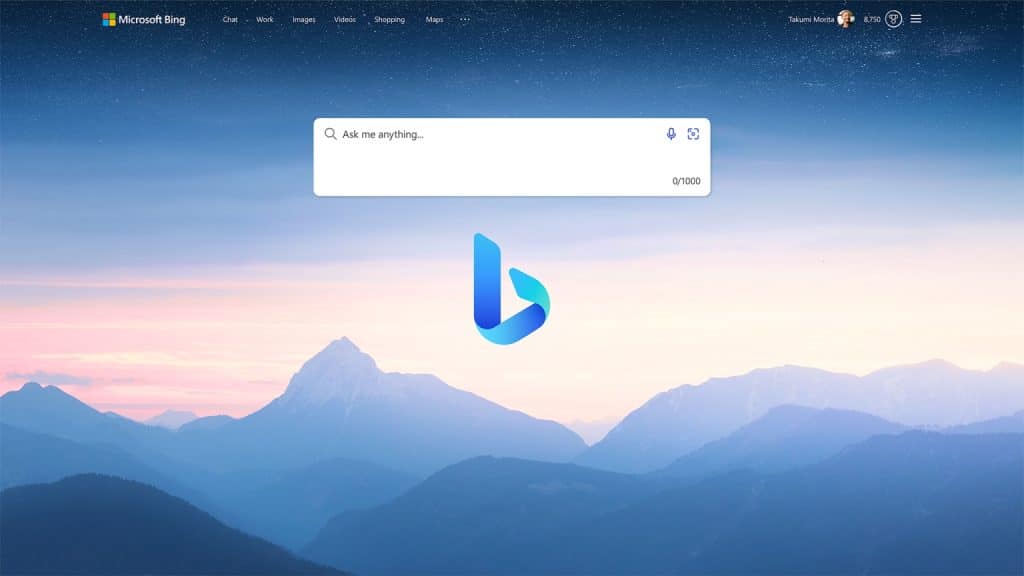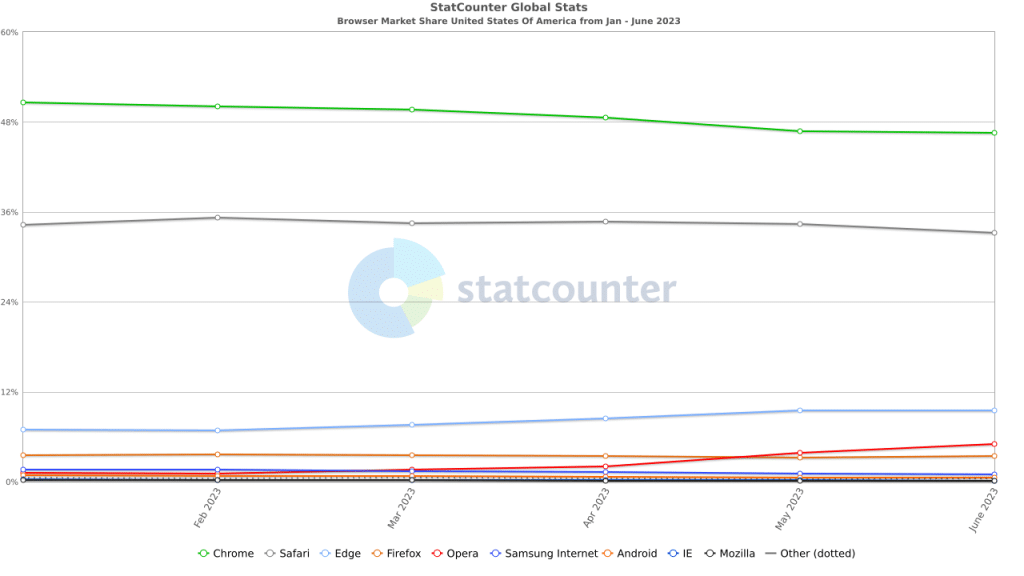
May 8, 2023
Bing Search? Yes, Really: 3 Questions About Bing’s Growing Market Share
If you’ve been keeping up with the latest in SEO, you’ve likely seen plenty of discussion about how AI will dramatically change how we search for things online. There’s massive intrigue and concern here, as AI-powered search will almost certainly impact rankings, CTRs, and SEO ROI.
Notably, many marketers wonder if we’re about to see the preeminent overlord of search dethroned by a much smaller competitor, which could fundamentally reshape how we approach SEO.
But before we start updating our SEO strategies, it’s worth asking if the revamped Bing AI search engine is even affecting Google’s massive share of the search market.
As of this writing, Google dominates the internet with over 88.9% of the U.S. search engine market and over 46% of the U.S. browser market. With a footprint that big, it’s no wonder digital marketers almost exclusively focus their SEO efforts on Google’s algorithm and guidelines.
However, thanks to new tools powered by AI, Microsoft’s Bing search—yes, Bing—has seen unprecedented growth within a relatively short period, fueling speculation that Google’s days of uncontested control are numbered.
So, is Microsoft’s apparent AI dominance propelling us toward a David vs. Goliath showdown?
Let’s see what Bing, Edge, and AI have in store for the future of search and if it’s making any noticeable difference in the overall search engine market.
Where Did All the New Bing Search Users Come From?
In early February, Microsoft announced new preview versions of the Bing search engine and its Edge browser, both powered by AI and chat.
Positioned as an “AI copilot for the web” and “combining Search + Answers + Chat + Creation in one experience,” the tools rapidly demonstrated their value, pushing Bing search’s total daily active users past the 100 million mark within the first month.

Source: Official Microsoft Blog
About a third of those users are new to Bing, Microsoft said. Additionally, a third of daily preview users are also using Chat daily. Users average three chats per session, and since the preview began, Bing has seen over 45 million total chats.
For the second-largest search engine in the world, this was big news. But those who’ve been following the rise of the AI search engine and Microsoft’s involvement weren’t surprised by the swell of interest in the new Bing and Edge.
ChatGPT—the heart of Bing and Edge’s newest versions—didn’t just come out of nowhere. It was developed by OpenAI, which was founded with significant Silicon Valley backing in 2015 and, in 2019, received a much-needed investment from—you guessed it—Microsoft.
After an initial investment of $1 billion in 2019, Microsoft has since pumped even more capital into OpenAI earlier this year, estimated around $10 billion.
It goes to show that Microsoft has long had a notion of AI’s massive potential as it relates to search, and we can safely assume Google has seen the same writing on the wall.
So far in 2023, Microsoft has enjoyed all of the buzz and none of the bugs.
On the other hand, Alphabet saw $100 billion in market value evaporate after Google’s AI chatbot, Bard, incorrectly answered a question about the James Webb Space Telescope in a promotional video.
Not a good look for Google.
How Significant Is the Growth of Search on Bing?
Statistically speaking, it isn’t.
Sure, the team at Bing should feel great about surpassing the 100 million daily active users threshold. But for Google, those numbers are a small drop in the bucket, as their comparative figures sit well over 1 billion.
Let’s look at it in terms of U.S. browser market share.
In the first 6 months of 2023, Chrome saw its share decline from 50.59% to 46.53%. For reference, Safari sits securely in second place, with 33.23% of the market in June.
 Source: StatCounter
Source: StatCounter
To put it politely, Edge is a distant third, with just 9.51% of the market in June.
Still, this is a marked increase from the beginning of the year, when its share sat at 6.91%. And you don’t need to open your calculator app to see that Edge’s growth is suspiciously similar to Chrome’s decline.
The crux of the issue isn’t whether Edge and search on Bing are taking off. Rather, any potential facelift to the search engine landscape would largely depend on the success or failure of Google Bard.
Is the Bing AI Search Engine Really Going to Overtake Google?
Short answer: It’s highly unlikely.
Long answer: It’s reasonable to assume a huge portion of Microsoft’s recent upswell is due to the hype around ChatGPT in general. Whenever software is able to pass the bar exam, it’s bound to generate attention. Users want to try it for themselves, hence all the new Bing search users recently.
But the question remains: Will Bing AI deliver a fundamentally superior search experience to enough users that people would ditch Google in droves?
That simply isn’t going to happen.
Yes, there are always early adopters, but historically speaking, humans just don’t work that way.
We build habits, and breaking them can be exceptionally difficult. Often, our habits revolve around form as much as they do function. And, when it comes to form, there’s simply no contest between Google and Bing.
Google has transcended what it means to be a search engine. Google isn’t a product or a service—it’s a verb.
The next time you wonder whether Google is on the way out, stop and think about the last time someone asked you to “Bing” something.
You’re not the only one who can’t picture this scenario, which shows Bing still faces challenges if it wants to overtake Google.
With that being said, any gain in market share, no matter how small, is still movement in the right direction for Bing, so it’s worth considering if now is a good time to allocate some additional SEO and PPC resources to the search engine.
Navigate the Next Generation of Search with VELOX Media
Whether it’s generative AI, Microsoft’s Prometheus, or Google Lens, the way we search is on the cusp of significant changes.
Our SEO experts use cutting-edge tools and the latest research to customize revenue-modeled digital marketing strategies for our clients, targeting 400-800% ROI but often going even higher.
Ready for SEO services that will help you crush KPIs and exceed your expectations? Contact VELOX today and see how exponential growth looks on your business.